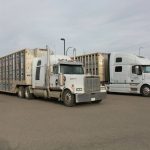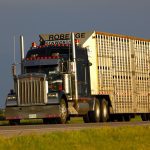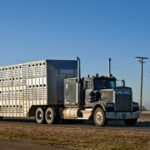
Tag Archives livestock transportation

Research shows rest stops of no benefit to feeder calves during long hauls
A recent research trial has confirmed earlier studies showing rest stops offer no health or welfare benefits to beef calves
Three Canadian transport trials showed that providing a rest stop during long-distance transport provided no clear or consistent benefits for the health or welfare of feeder calves.

Do transport rest stops put calf health at risk?
Research on the Record with Reynold Bergen
The Canadian Food Inspection Agency revised the Transportation of Animals regulations a few years ago. Among other things, the revised regulations require longer and more frequent feed, water and rest stops during long-haul transport. Over the past few years, this column has summarized three research trials conducted by Dr. Karen Schwartzkopf-Genswein’s team at Agriculture and Agri-Food […] Read more

Electronic logs in trucking industry raise concerns for fall cattle run
A shortage of drivers combined with regulations around rest times could add up to complications for truckers and auction marts this fall
Truck drivers have always travelled for long hours — especially when hauling livestock over the prairie or into the boreal forest of northern Ontario to their destination. Such trips illustrate the tricky balance between ensuring drivers get enough rest, yet complete the trip as quickly as possible for the sake of the animals they’re hauling. […] Read more

CCA reports: Transport regulations, foot-and-mouth and youth programs
From the February 2023 issue of Canadian Cattlemen
It didn’t take long for board members and staff at the Canadian Cattle Association (CCA) to get back into the swing of things following the holiday season. The promise of a new year has brought a renewed energy to push forward on key policy files affecting cattle producers across the country, investing in our next […] Read more

Comment: CFIA needs to recognize research on long hauls
I am not sure how the folks at the Canadian Food Inspection Agency (CFIA) looked at the recent research on rest stops for long-haul trips and concluded it supported the changes to transportation regulations, but they’ve done it. “The study summary on the BCRC’s website supports the current maximum allowed interval without feed, water and […] Read more

Preparing to ship cattle safely during the fall run
Using the VBP+ Shipping Record to maintain food safety, animal care and public trust
The fall run is not just a busy time of year for auction marts. For cow-calf and feedlot producers, fall is a mad dash of buying and selling. At times like this, it becomes hard to remember some key points related to food safety and animal care that become relevant when shipping calves or other […] Read more

Strike three? Transport rest stops still don’t show a benefit for weaned calves
Research on the Record with Reynold Bergen
In 2017, the Canadian Food Inspection Agency released draft transport regulations requiring that all cattle receive a minimum eight-hour feed, water and rest break after a maximum of 36 hours in transit. Because there was no relevant science to support this decision, Agriculture and Agri-Food Canada (AAFC) and the BCRC funded a Beef Cluster project […] Read more

New requirements for animal transfer of care documents
News Roundup from the December 2021 issue of Canadian Cattlemen
On February 20, 2020, the Health of Animals Regulations: Part XII: Transport of Animals was amended. While the name of this legislation may not ring a bell, most producers caught word of the reduction in maximum allowed intervals without feed, water and rest for animals in transport. However, this is far from the whole story. […] Read more

Agri-food intelligence network announces third funded project
The Canadian Agri-Food Automation and Intelligence Network (CAAIN) has unveiled the third project to be funded through its 2020 Closed Competition. Providing Transport Assurance Via Generic Data Enablers, led by Ontario’s Transport Genie, requires modest funding but promises to deliver significant results. “Data-driven decision-making is the backbone supporting ag-tech innovation,” said CAAIN CEO, Kerry Wright. […] Read more

e-Manifests hit the road in Alberta
Identification: News Roundup from the November 2016 issue of Canadian Cattlemen
A staged rollout of an e-manifest being developed by Alberta’s Livestock Identification Services (LIS) for the province’s cattle producers and horse owners is now underway with plans to add sheep in due time. An electronic version of the paper manifest has been available since June for transport only. It can be used by producers when […] Read more



